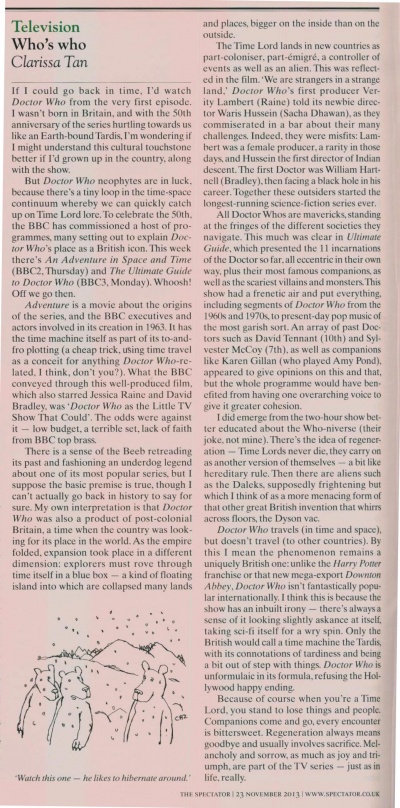Who's Who
- Publication: The Spectator
- Date: 2013-11-23
- Author: Clarissa Tan
- Page:
- Language: English
If I could go back in time, I'd watch Doctor Who from the very first episode. I wasn't born in Britain, and with the 50th anniversary of the series hurtling towards us like an Earth-bound Tardis, I'm wondering if I might understand this cultural touchstone better if I'd grown up in the country, along with the show.
But Doctor Who neophytes are in luck, because there's a tiny loop in the time-space continuum whereby we can quickly catch up on Time Lord lore. To celebrate the 50th, the BBC has commissioned a host of programmes, many setting out to explain Doctor Who's place as a British icon. This week there's An Adventure in Space and Time (BBC2, Thursday) and The Ultimate Guide to Doctor Who (BBC3, Monday). Whoosh! Off we go then.
Adventure is a movie about the origins of the series, and the BBC executives and actors involved in its creation in 1963. It has the time machine itself as part of its to-andfro plotting (a cheap trick, using time travel as a conceit for anything Doctor Who-related, I think, don't you? ). What the BBC conveyed through this well-produced film, which also starred Jessica Raine and David Bradley, was 'Doctor Who as the Little TV Show That Could'. The odds were against it - low budget, a terrible set, lack of faith from BBC top brass.
There is a sense of the Beeb retreading its past and fashioning an underdog legend about one of its most popular series, but I suppose the basic premise is true, though I can't actually go back in history to say for sure. My own interpretation is that Doctor Who was also a product of post-colonial Britain, a time when the country was looking for its place in the world. As the empire folded, expansion took place in a different dimension: explorers must rove through time itself in a blue box - a kind of floating island into which are collapsed many lands and places, bigger on the inside than on the outside.
The Time Lord lands in new countries as part-coloniser, part-emigre, a controller of events as well as an alien. This was reflected in the film. 'We are strangers in a strange land, ' Doctor Who's first producer Verity Lambert (Raine) told its newbie director Waris Hussein (Sacha Dhawan), as they commiserated in a bar about their many challenges. Indeed, they were misfits: Lambert was a female producer, a rarity in those days, and Hussein the first director of Indian descent. The first Doctor was William Hartnell (Bradley), then facing a black hole in his career. Together these outsiders started the longest-running science-fiction series ever.
All Doctor Whos are mavericks, standing at the fringes of the different societies they navigate. This much was clear in Ultimate Guide, which presented the 11 incarnations of the Doctor so far, all eccentric in their own way, plus their most famous companions, as well as the scariest villains and monsters. This show had a frenetic air and put everything, including segments of Doctor Who from the 1960s and 1970s, to present-day pop music of the most garish sort. An array of past Doctors such as David Tennant (10th) and Sylvester McCoy (7th), as well as companions like Karen Gillan (who played Amy Pond), appeared to give opinions on this and that, but the whole programme would have benefited from having one overarching voice to give it greater cohesion.
I did emerge from the two-hour show better educated about the Who-niverse (their joke, not mine). There's the idea of regeneration - Time Lords never die, they carry on as another version of themselves - a bit like hereditary rule. Then there are aliens such as the Daleks, supposedly frightening but which I think of as a more menacing form of that other great British invention that whirrs across floors, the Dyson vac.
Doctor Who travels (in time and space), but doesn't travel (to other countries). By this I mean the phenomenon remains a uniquely British one: unlike the Harry Potter franchise or that new mega-export Downton Abbey, Doctor Who isn't fantastically popular internationally. I think this is because the show has an inbuilt irony - there's always a sense of it looking slightly askance at itself, taking sci-fi itself for a wry spin. Only the British would call a time machine the Tardis, with its connotations of tardiness and being a bit out of step with things. Doctor Who is unformulaic in its formula, refusing the Hollywood happy ending.
Because of course when you're a Time Lord, you stand to lose things and people. Companions come and go, every encounter is bittersweet. Regeneration always means goodbye and usually involves sacrifice. Melancholy and sorrow, as much as joy and triumph, are part of the TV series - just as in life, really.
Disclaimer: These citations are created on-the-fly using primitive parsing techniques. You should double-check all citations. Send feedback to whovian@cuttingsarchive.org
- APA 6th ed.: Tan, Clarissa (2013-11-23). Who's Who. The Spectator .
- MLA 7th ed.: Tan, Clarissa. "Who's Who." The Spectator [add city] 2013-11-23. Print.
- Chicago 15th ed.: Tan, Clarissa. "Who's Who." The Spectator, edition, sec., 2013-11-23
- Turabian: Tan, Clarissa. "Who's Who." The Spectator, 2013-11-23, section, edition.
- Wikipedia (this article): <ref>{{cite news| title=Who's Who | url=http://cuttingsarchive.org/index.php/Who%27s_Who | work=The Spectator | pages= | date=2013-11-23 | via=Doctor Who Cuttings Archive | accessdate=27 May 2025 }}</ref>
- Wikipedia (this page): <ref>{{cite web | title=Who's Who | url=http://cuttingsarchive.org/index.php/Who%27s_Who | work=Doctor Who Cuttings Archive | accessdate=27 May 2025}}</ref>
